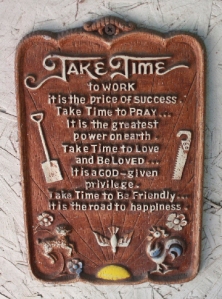(originally posted October 6, 2010)

I don’t know how many times I re-read Raymond Carver’s short story collection “What We Talk About When We Talk About Love,” over the years, but the spine of the book eventually fell apart if that tells you anything. Carver had that particular kind of talent that could surgically slice through the emotional muscle we build up over our hearts, all the better to prod at what lies below. But while I still crave stories that seek to answer what for me has been one of life’s most mystifying question ~ what DO we talk about when we talk about love ~ with respects to Carver, I’m tired of quiet denouements that artfully foretell a future in which lasting true love is pretty much a hopeless proposition. I’ve spent a lifetime mucking about in the name of love, licking my wounds, acknowledging my mistakes. If all that doesn’t confer wisdom, at least let me celebrate the fact that it speaks to a enduring optimism of the heart.
When I was younger I was epically naïve on this (and sadly many other) subjects. I had the requisite young person’s immediate apathy towards any marriage that smacked to me of convention, rejecting the kind of relationship where after you stripped away the holidays, martini hour and whose responsibility it was to pick Jimmy up from Judo there was no deeper intellectual connection to carry the day once the children had grown. I was sticking too closely to the Ibsen script by only defining ‘convention’ as some narrow set of rules for conduct dictated solely by the mores of the day. Convention ~ old fashioned values ~ also means following a code of honor that often puts character above passion, especially bad news for my horny generation. This didn’t occur to me then, not even when friends of my parents started to get divorced in blockbuster numbers. It was easier to blame the institution.
 My generation held out the hope that through equality of the sexes we might remedy what had been wrong with marriages that came before us, but we swung the pendulum too far in the other direction. Trying to create an agenda of shared interests, even going so far as to swap roles like wage earning and child rearing, we too often fell into over analyzing every interaction, awarding stars for good behavior, taking away privileges when we fell short. Feelings, instead of providing a way into the loved one's psyche, all too often became the shield we used to protect ourselves. As often follows when one gets ready for battle, after the shield came the sword.
My generation held out the hope that through equality of the sexes we might remedy what had been wrong with marriages that came before us, but we swung the pendulum too far in the other direction. Trying to create an agenda of shared interests, even going so far as to swap roles like wage earning and child rearing, we too often fell into over analyzing every interaction, awarding stars for good behavior, taking away privileges when we fell short. Feelings, instead of providing a way into the loved one's psyche, all too often became the shield we used to protect ourselves. As often follows when one gets ready for battle, after the shield came the sword.
So here is a marital parable for our times. When Earl Fincher met Myrna Hall 52 years ago, he wasn't looking for a meaningful relationship. He was a 20- year old boy intent on sowing his wild oats. She was a beautiful 15-year old with a wide open heart. They met a dance. He had no money and few prospects. There was no conscious meeting of the minds, no existential conversations or résumé sharing, just an honest physical attraction they could not ignore. Marriage was the last thing on either of their minds. Earl worked long hours, just as he had done since he was 8 years old, the year his parents left Missouri for a protracted hardscrabble journey west that eventually landed them in California, in the small farming town of Healdsburg, doing migrant work picking in the fields.
Possessed of a relentlessly curious mind, Earl has an uncanny ability to think endlessly on all manner of things that fall into the ‘how to build a better birdhouse’ category. But then, as now, when it comes to what the rest of us consider the ‘big’ issues, like wrong from right, he does not have to think much at all. The way he sees it, there are the things in life you have to wrestle to the ground to figure out, and then there is the stuff you should just know. He knew what to do when he took measure of Myrna. He married her.
 If Myrna was scared starting out so young in life with a man that had but $11 in his pocket ($10 after they paid the preacher) she is not saying so now. They met in Spring, by Christmas she had given birth to their first child. Life was good but hard. Only once did they have to break Earl’s cardinal rule ~ never rely upon anyone else ~ and then only to stay with Myrna’s family for a few weeks during a particularly rough time. They saved every dollar, working and living up at Michel-Schlumberger, followed by a stint at Gallo. A lucky conversation Earl overheard one day looking for work brought him to the gates of the mill in Healdsburg just as construction in the area was taking off. With Earl’s work ethic, it’s not surprising a one-day job turned into a 26 year career.
If Myrna was scared starting out so young in life with a man that had but $11 in his pocket ($10 after they paid the preacher) she is not saying so now. They met in Spring, by Christmas she had given birth to their first child. Life was good but hard. Only once did they have to break Earl’s cardinal rule ~ never rely upon anyone else ~ and then only to stay with Myrna’s family for a few weeks during a particularly rough time. They saved every dollar, working and living up at Michel-Schlumberger, followed by a stint at Gallo. A lucky conversation Earl overheard one day looking for work brought him to the gates of the mill in Healdsburg just as construction in the area was taking off. With Earl’s work ethic, it’s not surprising a one-day job turned into a 26 year career.
By 1970 they had finally saved enough to put a down payment on some land. It was 3 ½ acres on Chalk Hill Road for $7,000, a price that was not as cheap as it sounds today ~ certainly not for them. But they managed to pay it off and finance a loan to build a house. It is the house they still live in, raising their family of five, year by year expanding the verdant patchwork of raised beds and fields from which they now feed their many loyal customers and restaurants like Barndiva. It is a source of great pride to them that they paid off that 30 year mortgage ~ though it took them every one of those 30 years ~ just like they said they would.
Early Bird's Place is laid out in a jumble of outbuildings, all with a different purpose, all filled with inventions Earl has designed over the years. Myrna calls the stuff that fills the ranch house, garage, potting and gourd drying sheds and chicken coops ‘creative clutter’. She closes her eyes, sighs and smiles when she says the word creative, adding that Earl is a man incapable of throwing anything away. It is something she both hates and loves about him, in unequal measure. Unequal is the operative word because, according to Myrna, love is never equal at any given moment in time. After more than fifty years together they have seen all the fault lines in each other; it no longer matters who is right or who is wrong. So long as I always put Earl first in my thoughts, she will tell you, and he does the same for me.
A few weeks back I visited them at the farm with Drew Kelly, a talented young photographer who is working to help me document Barndiva’s ties to a cadre of local farmers. It was a joy to see them together as I usually only ever see Myrna alone when she drops off produce and eggs at Barndiva's kitchen door. It struck me ~ as it must folks that see them together every week at Healdsburg’s Farmer's Market ~ how completely they compliment each other without either losing a beat on what makes them so interesting as individuals.
There is true adoration in their banter, which is played out in the physical dance they do as they move through their many rooms and linked gardens. Earl is short and wiry, these days he walks with most of his weight held high up in his shoulders, steering in a specific direction until something interesting catches his eye and he changes course. Myrna is rounder, more kinetic as she moves, with an almost tendril quality in the way she constantly reaches out with the part of her that is most vulnerable, fragile wrists encased in protective bands where repetitive strain injury has taken its toll. When the distance between them grows too great she weaves back to him in looping circles. In this way they trade off who leads and who follows.
This then is the secret of their marriage: it doesn’t matter who leads or who follows. By not constantly reassessing how the other might be falling short, or what might be missing from their marriage, they never made the fatal mistake of taking what they did find in each other for granted. If it always wasn’t this way, it hardly matters now. I learned to button my lip early on, Myrna will tell you, the important thing is to be patient, to know that marriage has a way of balancing out. There’s nothing I wouldn’t do for her, Earl will tell you. She’s is my life’s helpmate. For a man who understands the nature of life as hard work, there is no greater compliment he could give.



